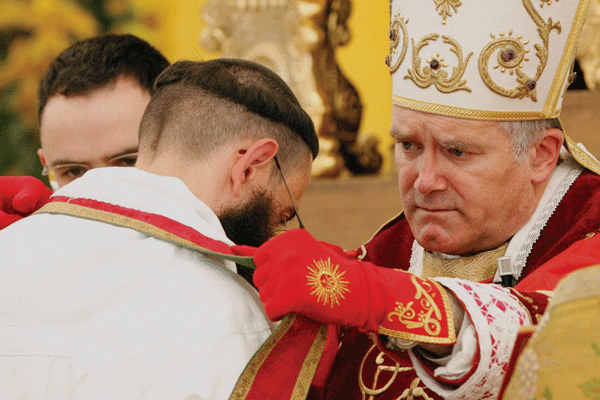ROME—Just months after rumors indicated Pope Francis might be close to normalizing the situation of a breakaway traditionalist Catholic group, its leader now says that due to “painful confusion” in the Church encouraged by the pontiff, the group may not actually want such recognition.
Bishop Bernard Fellay, leader of the priestly Society of Saint Pius X, released a statement Wednesday saying that “in the great and painful confusion that currently reigns in the Church, the proclamation of Catholic doctrine requires the denunciation of errors that have made their way into it and are unfortunately encouraged by a large number of pastors, including the pope himself.”
The four-point statement follows a June 25-28 meeting of the society’s superiors in Switzerland. The second point says that considering “the present state of grave necessity” of the Church, which gives the society the right and duty to help “the souls that turn to it,” seeking canonical recognition is not a priority.
“[The society] has only one desire: faithfully to bring the light of the bi-millennial tradition, which shows the only route to follow in this age of darkness in which the cult of man replaces the worship of God, in society as in the Church,” Fellay wrote.
Fellay claims that the purpose of the Society of Saint Pius X is the formation of priests, the “essential condition for the renewal of the Church and for the restoration of society.”
The society, also known as the “Lefebvrists” for their founder, the late French Archbishop Marcel Lefebvre, was born after the Second Vatican Council, which ended in 1965.
Lefebvrists generally have reservations about several of the teachings of the council, particularly in regard to ecumenism, interreligious dialogue, freedom of religion, and some aspects of the liturgical reform, including the use of the older Latin Mass.
Despite the strong words against the pope, Fellay also writes that the group continues to pray and do penance for him, so that he might have the “strength to proclaim Catholic faith and morals in their entirety.”
Last September, Francis surprised many by extending an olive branch to the breakaway traditionalist group by decreeing that during his Holy Year of Mercy anyone who confesses their sins to a priest of the society will be considered validly forgiven.
In April, after a private meeting with the pope, Fellay said the pontiff had promised to extend this recognition indefinitely.
Fellay has had an ambivalent relationship with the pope. He’s expressed “happiness” over his meeting with Francis, who allegedly said he’d never condemned the group and that in his eyes they were “very much part of the Church.”
Yet during a homily after said meeting, the bishop also said that Francis’s recent apostolic exhortation on the family, Amoris Laetitia, “makes us cry,” adding that its stance on access to the Sacraments for divorced and civilly remarried couples makes this a “terrible document which harms the Church.”
In Fellay’s own words, Francis is “totally atypical” and a man hard to pin down in the “usual categories.”
“I would say one of the major problems we have is that the normal way of judging someone is by his actions and conclude, ‘He’s acting like this because he thinks like that.’ So [we] go back to a doctrine or sometimes an ideology,” Fellay said in a May interview.
“But if you try to do so with the present pope, you’re totally puzzled, because one day he does something and the next day he does or says almost the contrary,” he added.











